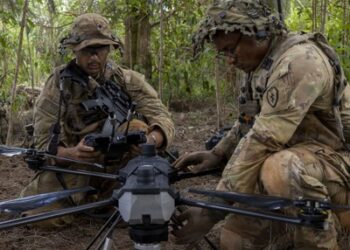The U.S. is reportedly lagging in biotechnology development, according to Senator Todd Young (R-Ind.), who commented on this issue during an event on Wednesday. Young emphasized that he and other lawmakers are striving to ensure that the U.S. advances alongside China, particularly regarding the incorporation of technologies such as gene editing for enhancing human performance in military operations.
As funding for scientific research faces cuts under the Trump administration, Young and his colleagues are advocating for recognition of biotechnology not only as a crucial national security matter but also as a significant economic engine for influential voter bases. “One general category in which the Chinese, in particular, are out-classing us, is in bio-manufacturing, industrial applications of biotech . . . and new life-saving compounds that could be a great utility to warfighters,” Young stated.
A report published in April by Young’s National Security Commission on Emerging Biotechnology put forth 49 recommendations focused on how the United States can better invest in and utilize biotech for defense purposes. The report suggested that “biological sensors could detect pathogens or chemical threats in real time, creating a dynamic and resilient system for battlefield awareness.” It also highlighted the potential for technologies like dynamic biological camouflage and wearable biosensors that could enhance military operations based on real-time data.
Young pointed out additional possibilities involving shelf-stable blood products to aid in combat lifesaving and the integration of various materials into weapon systems. Concerns regarding the administration’s scientific funding cuts are prevalent in Congress, particularly regarding a $4 billion reduction affecting universities, hospitals, and other institutions.
Representative Chrissy Houlahan (D-Pa.), co-founder of the BIOTech Caucus, expressed her alarm about the implications of these cuts on basic science and research, stating, “It’s a chilling effect at the business level and at the individual science levels.” She emphasized the illogical nature of undermining basic research if the goal is to lead in technology and manufacturing.
Houlahan, alongside her colleagues on the House and Senate Armed Services Committees, has included multiple biotechnology initiatives in the most recent National Defense Authorization Act bill. This includes a directive for the Pentagon to establish an official strategy concerning its biotech efforts.
Both Young and Houlahan viewed the CHIPS and Science Act, a significant piece of legislation by the Biden administration, as a positive sign of bipartisan support for investing in U.S. technological independence. Young noted the administration’s ability to back industrial policy, particularly when it benefits economically important areas, such as rural regions in the U.S., including Indiana.
He stressed the vast opportunities for biotechnology manufacturing in such states, arguing, “They campaigned on restoring a golden age of innovation. They particularly tried to connect with overlooked, under-appreciated people in rural America.” Young warned that if the administration does not pay attention to these issues, it risks losing the narrative to another political party that could emerge as a champion for rural America and bio-manufacturing. As the Trump administration continues its efforts to streamline federal agency functions, Young emphasized the need for a clear vision for the future.













